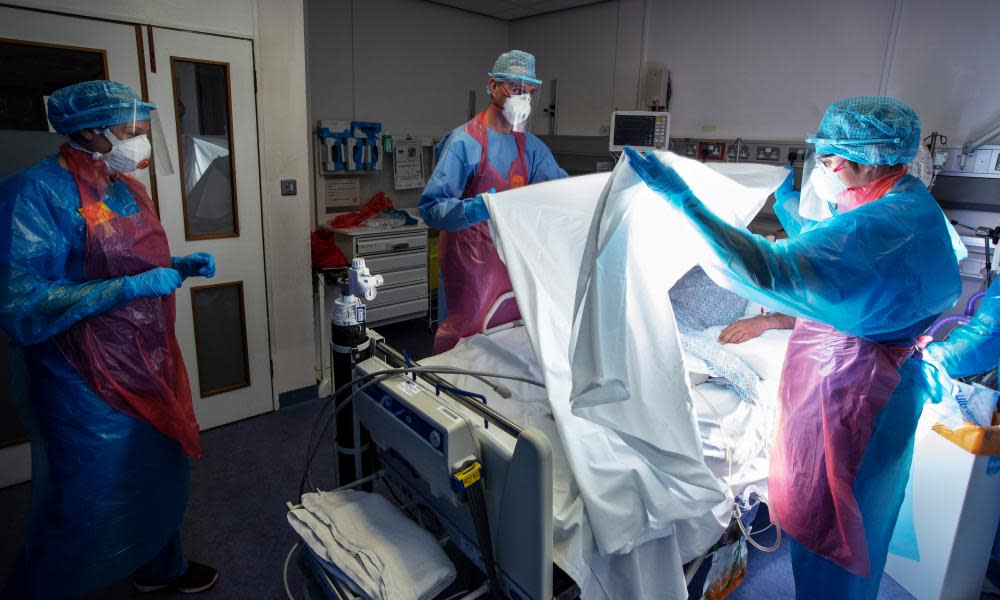The breakthrough medicines that could change the course of Covid

It remains one of the most dramatically successful outcomes in the battle against Covid-19. A cheap treatment for inflammation was found to save lives of seriously ill patients while a trio of much-touted therapies were shown to have no effect.
It is now estimated that the discovery of the effectiveness of the drug dexamethasone has saved around 650,000 lives across the world, according to Professor Martin Landray, a founder of the Recovery programme – the world’s largest randomised Covid-19 drugs trial – which revealed the medicine’s anti-Covid properties last summer. “In the UK alone, dexamethasone has already prevented more than 12,000 deaths,” he told the Observer.
The breakthrough demonstrates the power of large-scale randomised trials in pinpointing effective medicines and will be followed, in the next few weeks, with results from another handful of promising treatments being studied as part of the Recovery programme.
These medicines, which could be crucial in the fight to contain Covid-19 next year, are: convalescent plasma, taken from recovering Covid patients; monoclonal antibodies, made by Regeneron, that were used to treat Donald Trump; two anti-inflammatory drugs, tocilizumab and colchicine; and aspirin. All are undergoing trials carried out by thousands of doctors and nurses on tens of thousands of patients in hospitals across Britain. First results are expected in January or early February.
Recovery was set up by Landray and Peter Horby at the start of the Covid-19 pandemic. The two Oxford scientists realised doctors would soon be looking for treatments once cases started pouring into hospitals but would need a clinical trial to find which were effective. It took them nine days from drafting their first protocol to the enrolling of their first patient, a process that normally takes nine months. One in 10 patients hospitalised with Covid have since entered the trial.
And such numbers have been crucial to success, added Landray. Comparing 100 people who get a drug with 100 who do not can produce highly variable results. However, by randomising thousands of patients to get contrasting treatments, robust answers are produced.
“You find out which actually work,” said Landray. “In addition, we can discover which patients will benefit most. Will it be the old or the young or the immuno-compromised? You can only find that out if you have a trial with thousands of people in it.”
So far, Recovery – short for Randomised Evaluation of Covid-19 Therapy – has pronounced on four medicines: azithromycin, an antibiotic; the drug combination lopinavir-ritonavir; hydroxychloroquine, a treatment for malaria and rheumatic diseases; and dexamethasone. Only the last saved lives or aided recovery.
A hit rate of only one in four might seem poor value. However, the extraordinary numbers of lives saved thanks to dexamethasone demonstrates the value of the Recovery programme, the world’s largest randomised Covid-19 drug trial. The programme also ensured time and money have not been wasted on medicines that were found not to help patients.
And that will become an increasingly important issue, Landray said. “When we started Recovery we looked at cheap, widely available but promising drugs, and found one of them – dexamethasone – worked. But the medicines we’re looking at now will cost hundreds of pounds per treatment, so we need to be really sure they work before we deploy them on wide scale,” Landray said.
Having thousands of individuals with Covid-19 complications is a grim reality in the UK at present, but that high number at least makes it possible to run large-scale trials.
However there is a limit to what doctors and nurses can be expected to do, added Lanray.
“We designed this study to be as simple to implement as possible so as not to overwhelm busy frontline NHS staff. The support from them and patients has been remarkable. Our results have improved Covid care for millions. The answers we get early next year, whatever they are, will do so again.”
In the pipeline
Convalescent blood plasma is taken from those recovering from Covid-19 and has antibodies that may help others fight infections. Widely used in the US though scientists don’t yet know if it works or who would benefit most from it. The Recovery programme should have answers in a few weeks.
Monoclonal antibodies are artificial antibodies made by the US biotech company Regeneron and were used to treat Donald Trump. It is not yet clear at which stage of illness they should be administered.
Tocilizumab is an anti-inflammatory arthritis drug thought to hold considerable promise, though its exact benefits are unknown. It is also costly.
Colchicine is another promising anti-inflammatory drug; often used to treat gout.
Aspirin is a blood-thinning agent which could help reduce blood clots in the lungs – a worrying complication in some Covid-19 cases.

 Yahoo News
Yahoo News 